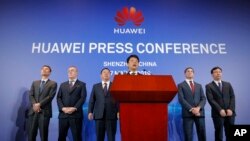Chinese technology business Huawei is taking the United States to court.
Huawei wants a U.S. federal court to rule on a law that identifies the company as a security risk. It also claims the measure would limit the company’s ability to sell its products in the United States.
Huawei Technologies Ltd. announced the legal action on Thursday. The case asks the court to reject as unconstitutional part of the legislation setting military spending levels. The measure bars the U.S. government and businesses working for the government from using Huawei equipment.
Huawei is the world’s largest maker of telecommunications technology. The company is fighting to keep its worldwide market share as phone carriers prepare to release the next generation of technology, called 5G. The U.S. government has urged America’s allies not to use Huawei equipment.
Huawei’s argument against the law
The lawsuit was filed in Plano, Texas, where Huawei has its U.S. headquarters. The company’s complaint argues that the law violates the U.S. Constitution. Huawei says the law punishes the company for unproven accusations, and would harm its future earnings.
Relations between the United States and China have been tense over technology competition and use of computers to gather information. Huawei has argued for years that it is not involved in Chinese spying. It also argues that the Chinese Communist Party has no control over the company.
“We [were forced] to take this legal action,” the company’s chairman, Guo Ping, said at a press conference. Guo said the ban would limit competition and lead to higher prices for telecom services. He also said it would delay the release of 5G communications.
In January, Huawei has said in court it is not guilty of U.S. trade-theft charges. The court statement came after a federal court in Seattle, Washington, announced charges against two of the company’s businesses in January.
Huawei’s chief financial officer, Meng Wanzhou, was arrested in Canada on December 1, 2018. The U.S. government has charged her with lying to banks about doing business with Iran. U.S. officials have asked Canada to send her to the United States for trial.
On December 10, China arrested two Canadians, a former diplomat and a businessman, in what many observers think is an attempt to get Canada to release Meng.
Huawei denies accusations
On Thursday, a Chinese foreign ministry official said China also objects to the U.S. law. He did not know if the government would join Huawei’s lawsuit. He added that Huawei has the right to defend its business through the legal system.
Huawei has about 40 percent of the international market for telecom equipment. But it sells very little in the United States after Congress said the company was a security risk in 2012. Congress told American businesses to avoid Huawei products.
Huawei says the new law would make it illegal for anyone working for the U.S. government to buy the company’s products. It would also ban any company in the world that uses Huawei products from working with the U.S. government.
The United States makes up 20 to 25 percent of the worldwide market for computer and telecom technology. Huawei says the law would shrink its market share.
The ban is “based on numerous false, unproven and untested” accusations, the company’s chief legal officer, Song Liuping, told reporters. He also said there is no “evidence” against Huawei.
Australia, Japan, Taiwan and some other governments also have set limits on using Huawei technology.
Huawei wants to negotiate with U.S. officials about their security concerns, but the law bars President Donald Trump from agreeing to negotiations, Guo said. He noted Trump has said he is against the ban of Huawei products.
Industry experts say banning Huawei from markets for 5G equipment could reduce competition. It might also cause higher prices.
Huawei says it supplies 45 of the world’s top 50 telecom companies. It also has agreements with 30 other companies to test 5G technology, it says.
Chinese officials and some industry experts say the U.S. government might be overstating security concerns to limit competition with Western telecom companies.
European governments are refusing to accept the U.S. requests to ban Huawei. The company has also announced deals with telecom companies in the Middle East.
I'm Susan Shand.
The Associated Press reported this story. Susan Shand adapted this story for VOA Learning English. George Grow was the editor.
Write to us in the Comments Section or on our Facebook page.
_____________________________________________________________
Words in This Story
theft – n. the act of stealing
file – v. to provide documents needed to launch a case or lawsuit
complaint – n. an official claim or accusation against someone or something





